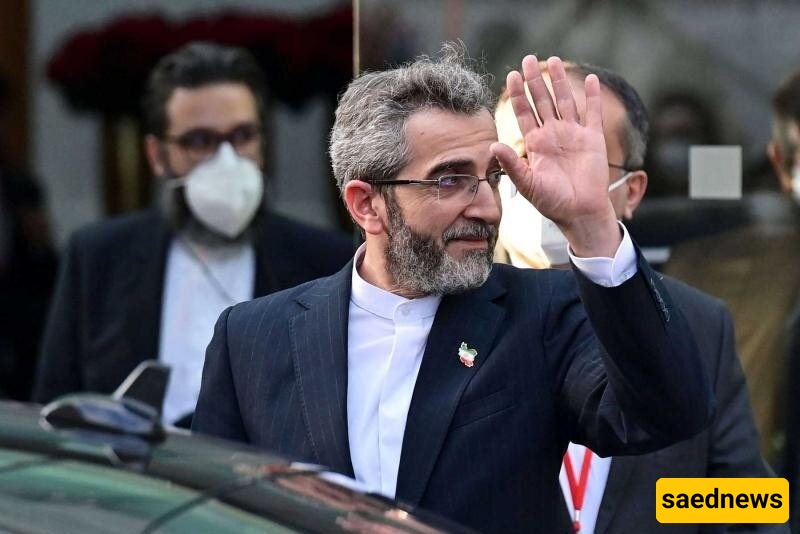SAEDNEWS: Ali Bagheri-Kani, once a staunch critic of the JCPOA, has now twice come close to signing a nuclear agreement under President Raisi and plays a key role in shaping Iran’s foreign policy.

The Secretary of the Supreme National Security Council issued a decree appointing Ali Bagheri-Kani as Deputy for International Affairs of the council.
According to SaedNews political service, quoting Ham-Mihan, the Secretary of the Supreme National Security Council appointed Ali Bagheri-Kani as Deputy for International Affairs of the council. Between 2021 and 2024, Bagheri was the Political Deputy of the Ministry of Foreign Affairs and after the martyrdom of Hossein Amir-Abdollahian in the helicopter crash carrying the President, he served as acting Minister from May 21 to August 22. On September 1, 2024, by the Supreme Leader’s decree, he became a member of the Strategic Council on Foreign Relations, and on September 15, he replaced Araqchi as Secretary of this council. On September 10, by ministerial decree, he was also appointed as Araqchi’s advisor. Between 2019 and 2021, he served as Deputy for International Affairs of the Judiciary and Secretary of its Human Rights Headquarters before returning to the Ministry of Foreign Affairs.
Ali Bagheri is the son of Mohammad Baqer Bagheri-Kani, a former member of the Assembly of Experts, and nephew of the late Mohammad Reza Mahdavi-Kani, a prominent principlist figure. A graduate of Imam Sadegh University, he was long known as one of Saeed Jalili’s close associates and began his managerial career in Ahmadinejad’s government. During Jalili’s tenure as Political Deputy, he served as Director General of Central Europe.
In 2007, when Jalili replaced Larijani, Bagheri served as acting Deputy of Europe and the Americas until 2008. In 2008, he moved to the Secretariat, where he worked until yesterday when he received his decree from Larijani. Until 2013, Bagheri was Jalili’s deputy in the Secretariat and senior negotiator on the nuclear dossier. His peak influence in Jalili’s circle was in 2013 when Jalili ran for the presidential elections and appointed Bagheri as head of his campaign.
A Hardline Critic of the JCPOA
During Hassan Rouhani’s presidency, Bagheri, as Jalili’s senior negotiator, was one of the strongest critics of the government’s foreign policy, especially in the first four years, opposing the nuclear negotiations and afterward. On December 26, 2017, on the sixth anniversary of martyr Mustafa Ahmadi-Roshan, he said at Sharif University: “Although some nuclear achievements of the Iranian nation were destroyed with concrete, the blood of nuclear martyrs still flows in the veins of young, faithful, creative, and revolutionary Iranians, and no concrete can deprive Iranian youth of their drive for progress.”
Facing Reality
Two years later, Ali Bagheri became Political Deputy of the Foreign Ministry and head of the nuclear dossier. It is not exactly clear what happened afterward, but Bagheri transformed into a supporter of the nuclear deal. A few months ago, in an interview with Amirhossein Sabti, a parliamentary representative and close associate of Saeed Jalili, it was noted: “Bagheri’s opinion about the JCPOA changed a lot. He disagreed with Jalili regarding the deal.” This change remains unclear, but under President Ebrahim Raisi, Bagheri twice came close to signing a nuclear deal, though internal and external reasons prevented it. Some believe this shift occurred due to Bagheri confronting the realities of foreign policy and the country’s situation.
Bagheri’s most notable statement on the nuclear deal dates back to July 2024, during a speech on multilateral cooperation at the UN Security Council: “The Islamic Republic of Iran has always demonstrated commitment to multilateralism, most notably through constructive participation in the JCPOA. The deal, as a successful multilateral initiative, addressed an unnecessary issue and a fabricated concern by Western countries regarding Iran’s peaceful nuclear program and was intended to lift unjust sanctions off the Iranian nation. Unfortunately, this multilateral process faced serious challenges due to Western and unilateral U.S. approaches. The U.S.’s unilateral withdrawal from the deal exemplifies unilateralism in the international arena, harming all parties to the agreement.”

